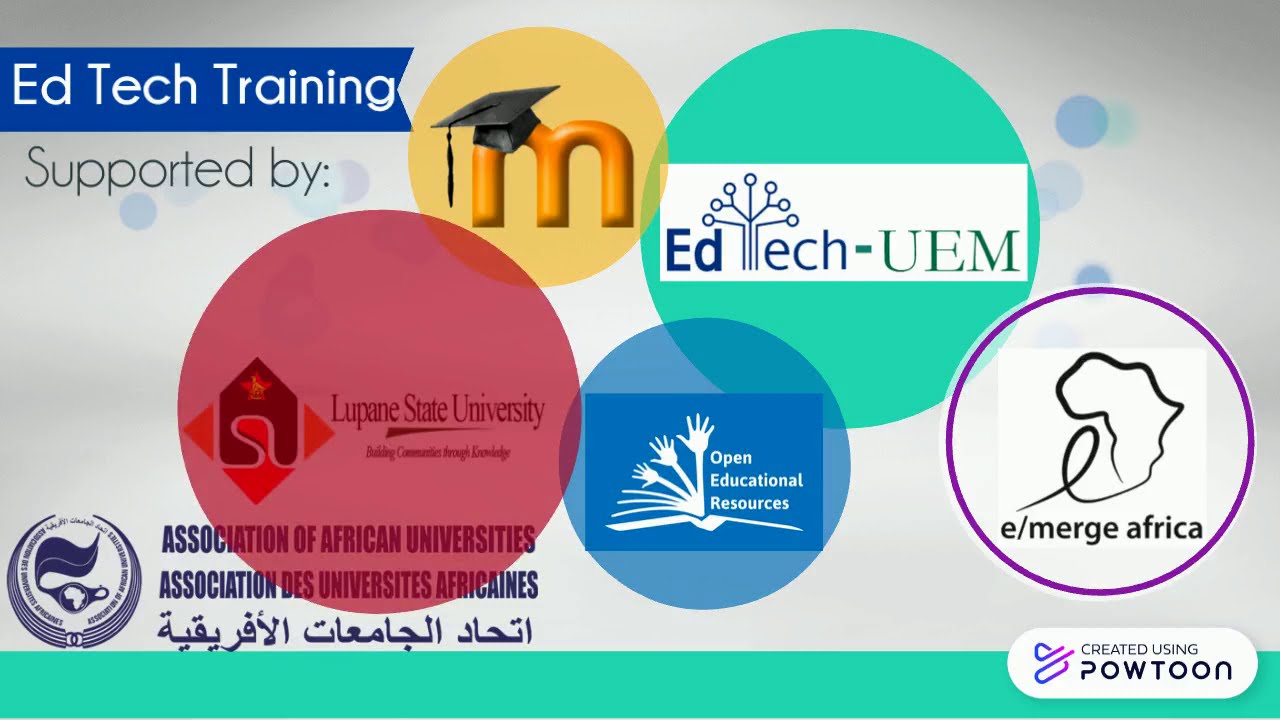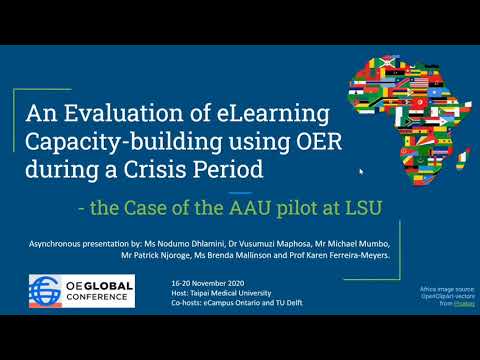Authors: Nodumo Dhlamini, Vusumuzi Maphosa, Michael Mumbo, Patrick Njoroge, Brenda Mallinson and Karen Ferreira-Meyers
Institutions: Association of African Universities, Lupane State University, EduTab Africa, Rhodes University
Countries: Ghana, Zimbabwe, Kenya, South Africa
Topic: Applications of Open Education Practices/Open Pedagogy/Open Education Research
Sector: Higher Education
UNESCO Area of Focus: Facilitating int cooperation
Session Format: Presentation
Abstract
The Association of African Universities’ (AAU) intention to provide Educational Technology virtual training using the Moodle Learning Management System (LMS) and Open Educational Resources (OER) was accelerated by the advent of the global COVID-19 pandemic. With Lupane State University (LSU, Zimbabwe) requesting immediate support in this area from the AAU, materials were sourced from existing OER developed in the African context and quickly repurposed for 100% online provision. The AAU mid-term vision of scaling up similar training for the benefit of all the Higher Education Institutions (HEI) in Africa, prompted the convening of a monitoring and evaluation (M&E) volunteer group to evaluate the suitability of the learning materials, the roles (facilitator, mentor and support), process, adapted mode of provision, participant experience, and the implications for the pilot beneficiary institution. This initiative proved to be a truly African collaboration between the AAU, LSU, volunteer facilitators, EdTech-UEM project materials, and the e/merge Africa adaptation of mode of provision as will be described in the full paper. Questions to be addressed via evaluation included whether the materials were fit for purpose, the extent to which the programme was provided appropriately in context, the effective use of the 80+ Moodle expert volunteers, whether the AAU training is repeatable, and finally what recommendations could be made to LSU to promote resilient eLearning adoption. Both qualitative and quantitative methods were used in the gathering of data. A pre-training participant survey was conducted of mostly quantitative questions, and during implementation the LMS continues to gather much quantitative data automatically with logs and reports easily generated to ascertain user engagement. Qualitative data is being gathered via participant reflective learning blogs, text chats during live conferencing sessions, Moodle FAQ and Tech Help Forums, evaluations after each of the four stages, WhatsApp support groups, the final participant and facilitator overall evaluation, and lastly LSU follow up interviews. The qualitative data is being analysed using Atlas.ti - a powerful tool for qualitative analysis of textual data. All evaluation data will be analysed and synthesised, and conclusions drawn to guide the responses to the questions posed. Early findings indicate that after 5 (of 7) weeks, approximately 56% of LSU participants are still engaging with the training programme, and approximately 40% of facilitators/mentors are still engaging, with some drop off in both cases being attributed to the resumption of face-to-face classes and examinations at LSU (participants) and the facilitator home institutions. Informal feedback indicates that the materials are viewed as fairly demanding in that they cover both online pedagogical design as well as Moodle skills training. Some further materials and mode of provision adjustments are anticipated as a result of the evaluation in order to promote success if/when reusing after this AAU-LSU pilot. The volunteer mode of facilitation needs to be carefully considered as it is clearly not sustainable going forward. Implications for LSU educationalists, researchers, and policymakers will be extrapolated from the data and may be of wider relevance for other African HEIs.Keywords
Evaluation, OER reuse, Volunteer facilitators, African context, Educational Technology, Capacity building, Continental collaboration

